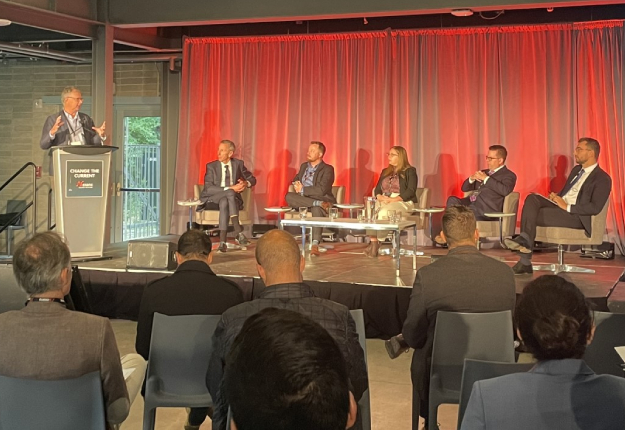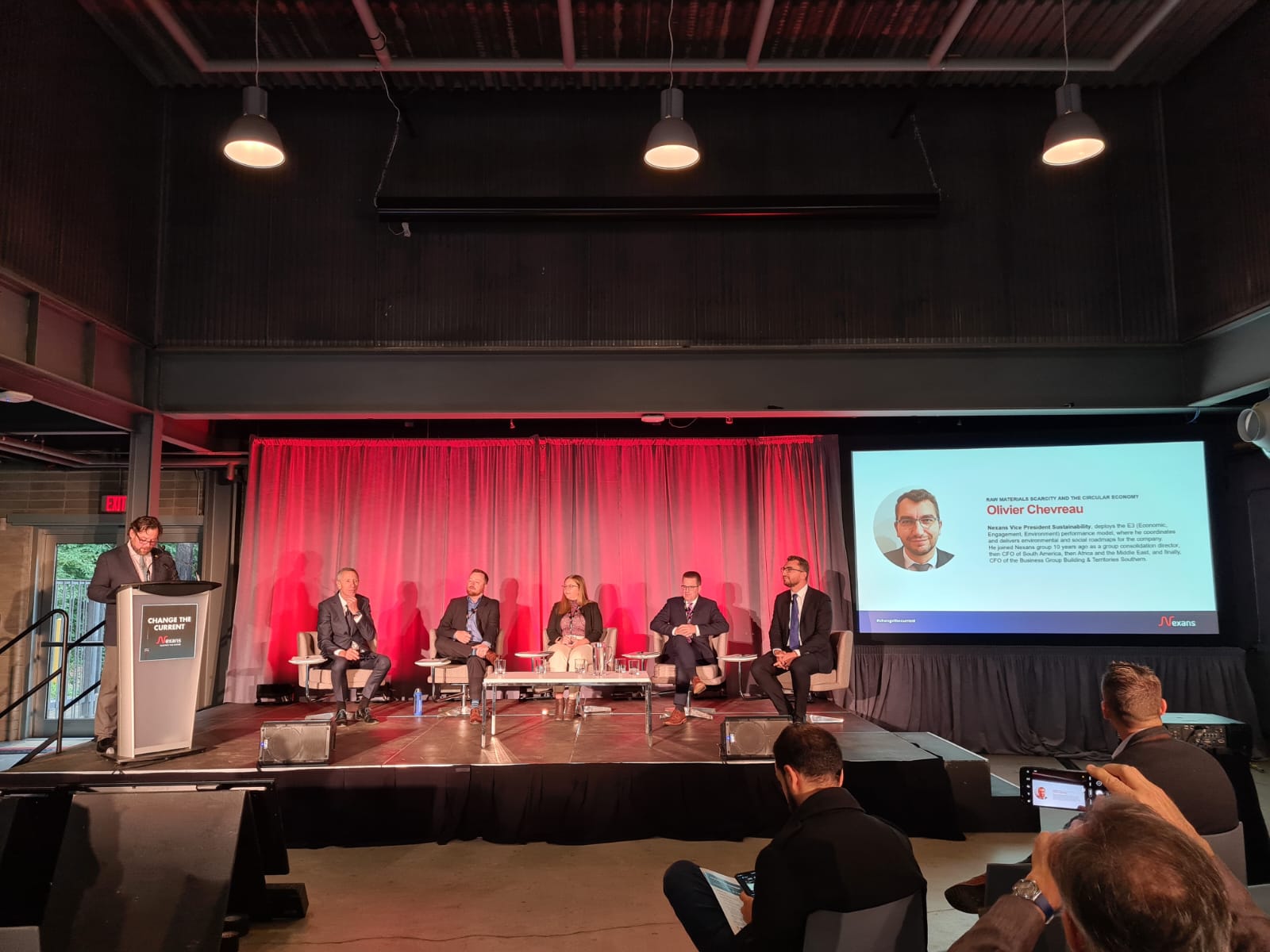Nexans Roundtable on Electrification and Achieving Net-Zero-Carbon Goals

October 4, 2022
By Blake Marchand
This article is the first in a two-part series exploring the discussion at Nexans’ Change the Current event hosted this past month at the Evergreen Brick Works in Toronto. The theme of the discussion was electrification, clean energy, and achieving net-zero-carbon in Canada by 2030.
Speakers and panelists included:
- Chris Turner, moderator; expert on sustainability, climate change, cleantech, and the global energy transition; and author
- Jerome Leroy, Nexans, Vice President North America, Building & Territories
- Olivier Chevreau, Nexans, Vice President Sustainability
- Bruce Lourie, influential environmental policy expert; bestselling author
- José Etcheverry, Associate Professor Faculty of Environmental & Urban Change at York University, Director International Renewable Energy Academy, Co-Chair Sustainable Energy Initiative
- Duncan MacLellan, Project Manager, Environment and Climate Division, City of Toronto
- Erin Andrews, Director of Sustainability and Circular Economy at SCV Consulting Ltd.
- Matthew McClearn, investigative reporter and data journalist with The Globe and Mail’s Energy, Natural Resources and Environment Team.
“This conversation is so important because the clean options are the cheapest and most effective options for grids across this country and increasingly, around the world,” moderator Chris Turner said to set the table for the discussion. To that end, Turner provided some take aways from a report he worked on with the Canadian Climate Institute on electrification in Canada. The main conclusion from that report, he said, was that clean electricity will power Canada’s net-zero transition, “it is essential to that transition.”
“Reaching Canada’s climate targets requires a big switch from fossil fuel energy to clean electricity, this switch involves producing more clean electricity in every region, using clean electricity to power more and more of the economy.”
“Making that big switch requires governments to use policy tools, ideally coordinated across governments across the country to enable that transition.”
“This is a tall order, it’s a lot of work, no one has all the answers; that’s why we need to be having the conversations that we’re having this morning.”
Clean electricity is not just wind and solar, it includes hydro and nuclear power as well. Turner noted that Canada gets more than 80% of its electricity from non-emitting sources. “We don’t think of ourselves as a renewable powerhouse because the non-emitting sources are predominantly hydropower and nuclear power.”
When it comes to CO2 emissions, however, Canada’s levels have increased 20% since 1990 primarily due to the oil sands. The increase in oil production is offset by coal phase outs in other provinces.
Along with being Canada’s oil capital, Alberta is also the renewable development capital for Canada, largely due to a lack of government regulation which makes it easier for renewable developers to get projects going. As Turner alludes to in his introduction, Dr. Bruce Lourie commented that regulation is actually necessary to promote growth. Despite the growing renewable industry in Alberta, implementing policy and regulations in coordination with other provinces and jurisdictions to strategically direct the investment and development in the industry is needed.
As an expert in environment policy, Lourie highlighted a few areas that are necessary to hitting net-zero targets: Provincial utilities and electricity system planners need to embed net-zero decarbonization plans into their regulation. Electricity sector technology and material suppliers need to establish a coordinated national industrial strategy to prioritize sector investments. Effective regional governance models should be established for cross-border planning and grid integration.
Other external factors Lourie noted include: Mobilization of businesses that will need clean decarbonized electricity to participate in planning of the future electricity system. Development of public engagement processes for indigenous and community infrastructure support. And creating support, awareness, and “investable opportunity” for the finance sector.
The technologies associated with clean electricity and electrification are being implemented but uncertainty remains about how we are going to achieve our net-zero goals as a country. To support electrification of things like heating, transportation, and manufacturing we need to increase the capacity of the grid while making the energy we produce cleaner and while also consuming efficiently.
There are some barriers to that. Policy and regulation across governments as mentioned above is one challenge. Modernizing the grid, incorporating new technologies like microgrids, nanogrids, roof top solar, wind, and hydrogen is a complicated process. Particularly, considering the work and investment utilities need to put into maintaining their current capacity.

A key component of electrification will be copper, which leads to more barriers as well as more opportunities. Right now, the global output of copper is equal to the total global demand; however, the demand is expected to increase because copper is needed for clean electricity and electrification.
There are three copper mills operating in North American, one in Canada, Nexans’ Montreal mill. And opening a copper mine is not as lucrative in terms of the investment required and the amount of time it takes to turn a profit. This puts increased pressure on how we use and recycle copper. Building out the circular economy around copper is an essential component to this. Nexans’ response is the Nexans Recycling Service where they provide the bins for collection of recycled copper and transportation of the bins to their mill in Montreal. Distributors can partner with Nexans and collect short length copper from contractors similar to how the Beer Store collects cans and bottles in Ontario.
Panelist Erin Andrews spoke to the importance of building up the infrastructure of a circular economy so that recycling of copper other building materials is easy for the construction industry. Having recycling programs on site or at distributors is good example.
“My proposal here is to extend the collaborative way of doing things by including our distribution partners,” commented Jerome Leroy on Nexans’ approach, “say to the electrical contractor: rely on the one that sold you the cable, mostly distributors, to have those short lengths collected back so you can be paid the right value of the copper.”
Nexans is able to use its resources to bring the broader industry into its goals and strategies for sustainability with programs like their copper recycling service.
In his presentation, Olivier Chevreau (Vice President Sustainability, Nexans) points out that there is balance in copper supply and demand but that demand will continue to rise as an essential component in digital technology and electricity. In an electric vehicle, Chevreau said for example, there is 200 to 300 pounds of copper compared to 20-30 pounds of copper in a gas vehicle.
“Copper is important for the digitization, for connection, connectivity,” he said, pointing out that there is 15 grams of copper in a smart phone, “it’s not only that, it will also be important for the energy transition.”
In Canada we have the one mill in Montreal as well as two copper mines, so production currently meets demand. But Chevreau pointed it out that in the U.S. the amount of copper demand is larger than what they produce.
What is clear from the discussion overall is that significant collaboration is required for this major shift in how we produce and consume energy to meet Canada’s net-zero targets for 2030. Canada’s goals aim for a 40%-50% (from 2005 levels) reduction in emissions, and in 2020, Canada’s emissions were only down 7% compared to 2005.
Although, there is a fair uncertainty regarding the future electricity landscape, the mood of Nexans’ Change the Current discussion was optimistic. Chevreau, Dr. Lourie, Dr. José Etcheverry, who spoke about the importance of human resources and developing a confident workforce through a program he is a part of at York University, all recognized the various challenges and impediments to the energy transition in order to highlight the immediate work that needs to be done by the industry.
The next article in this series looks more at Dr. Lourie’s presentation, as well as the perspectives of Duncan MacLellan, Erin Andrews, and Matthew McClearn.





![Guide to the Canadian Electrical Code, Part 1[i], 26th Edition– A Road Map: Section 56](https://electricalindustry.ca/wp-content/uploads/2022/11/Guide-CE-Code-2-768x432.png)




![Guide to the Canadian Electrical Code, Part 1[i], 26th Edition– A Road Map: Section 56](https://electricalindustry.ca/wp-content/uploads/2022/11/Guide-CE-Code-2.png)



